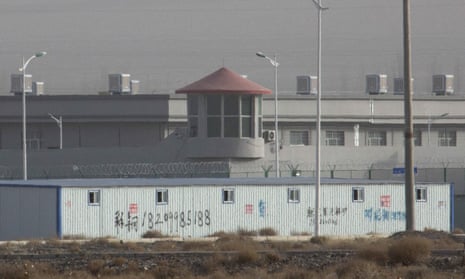At least 80,000 Uighurs have been transferred from Xinjiang province, some of them directly from detention centres, to factories across China that make goods for dozens of global brands, according to a report from the Canberra-based Australian Strategic Policy Institute (ASPI).
Using open-source public documents, satellite imagery, and media reports, the institute identified 27 factories in nine Chinese provinces that have used labourers transferred from re-education centres in Xinjiang since 2017 as part of a programme known as “Xinjiang aid”.
In conditions that “strongly suggest forced labour”, the report says, workers live in segregated dormitories, are required to study Mandarin and undergo ideological training. They are frequently subjected to surveillance and barred from observing religious practices. According to government documents analysed by the ASPI, workers are often assigned minders and have limited freedom of movement.
The factories were part of supply chains providing goods for 83 global brands, the report found, including Apple, Nike and Volkswagen among others.
China has come under mounting international scrutiny for its policies toward Uighurs and other Muslim minorities in Xinjiang, where as many as 1.5 million people have been sent to re-education and internment camps. Beijing, which says these facilities are voluntary vocational training centres, has said in recent months that most “students” of such centres have “graduated” and returned to society.
The report from the ASPI adds to growing evidence that even after being released from the camps, former detainees are still subject to severe controls and in some cases forced labour. The report’s authors said the actual number of those sent to other parts of China as part of the work programme was “likely to be far higher” than 80,000.
“This report exposes a new phase in China’s social re-engineering campaign targeting minority citizens, revealing new evidence that some factories across China are using forced Uighur labour under a state-sponsored labour transfer scheme that is tainting the global supply chain,” the researchers concluded.
Case studies highlighted in the report, titled Uyghurs for Sale, include Qingdao Taekwang Shoes, a factory in eastern China that produces shoes for Nike. The workers were mostly Uighur women from the prefectures of Hotan and Kashgar in southern Xinjiang, and attended night classes whose curriculum was similar to that of the re-education camps.
According to government notices, workers were required to attend the “Pomegranate Seed” night school, named after a policy that aims to make ethnic minorities and the majority Han Chinese ethnic group as close as the seeds of a pomegranate. At the school, workers study Mandarin, sing the Chinese national anthem and receive “patriotic education”. Public security and other government workers were to give daily reports on the “thoughts” of the Uighur workers.
Advertisements for “government-sponsored Uighur labour” have begun to appear more frequently online, according to the researchers. One ad read: “The advantages of Xinjiang workers are: semi-military style management, can withstand hardship, no loss of personnel … minimum order 100 workers!”
The report called on China to allow multinational companies unfettered access to investigate any potential instances of abusive or forced labour in factories in China, and for companies to conduct audits and human rights due-diligence inspections.
“It is vital that, as these problems are addressed, Uighur labourers are not placed in positions of greater harm or, for example, involuntarily transferred back to Xinjiang, where their safety cannot necessarily be guaranteed,” it said.
An Apple spokesman, Josh Rosenstock, told the Washington Post: “Apple is dedicated to ensuring that everyone in our supply chain is treated with the dignity and respect they deserve. We have not seen this report but we work closely with all our suppliers to ensure our high standards are upheld.”
A Volkswagen spokesman told the paper: “None of the mentioned supplier companies are currently a direct supplier of Volkswagen.” He said: “We are committed to our responsibility in all areas of our business where we hold direct authority.”
A Nike spokeswoman told the Post: “We are committed to upholding international labour standards globally,” adding that its suppliers are “strictly prohibited from using any type of prison, forced, bonded or indentured labour”. Kim Jae-min, the chief executive of Taekwang, the QingdaoTaekwang factory’s South Korean parent company, said about 600 Uighurs were among 7,100 workers at the plant, adding that the migrant workers had been brought in to offset local labour shortages.
